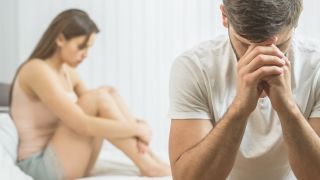Loving Your Body in the Bedroom
Most of us probably already know intuitively that body image affects our satisfaction and enjoyment of sexual experiences (Gillen & Markey, 2019). For many people, putting on a pair of pants that feel too tight, seeing a less-than-ideal number on a scale, or just thinking they’re not looking good on a given day can be a serious turn-off in the bedroom. For those who chronically experience poor body image, it’s common to report lower sexual satisfaction, more difficulty talking about sex, and even avoiding sexual activity altogether (e.g., see Ackard, Kearney-Cooke, & Peterson, 2000; Claudat & Warren, 2014).
Body image is a complex construct that describes how we feel, think about, and relate to our physical appearance (Tylka & Wood-Barcalow, 2015). In addition to being a central feature of preoccupation in people with eating disorders like anorexia nervosa and bulimia nervosa, being dissatisfied with one’s physical appearance is pervasive in the United States to the degree that it has been considered normative in community samples since the mid-1980s (Rodin, Silberstein, and Striegel-Moore, 1984).
Emerging research highlights how sexuality-related body image—the emotions, thoughts, and evaluations we make about our body in the context of sexual experiences or activities—can enhance or harm our romantic experiences. In a recent study of 11,620 US adults, Frederick and colleagues (2022) examined the degree to which people (1) perceived their body as sexually appealing, (2) were satisfied with their appearance when naked, (3) believed their body image affected their sexual enjoyment, and (4) felt sexually acceptable as a partner.
As predicted, data revealed that men and women with more positive sexuality-related body image engaged in sex more frequently. Demographic differences emerged such that people with lower body image tended to have larger physical bodies (as measured by body mass index) and were less likely to be in romantic relationships. Furthermore, women reported significantly less nude appearance satisfaction, sexual acceptability, and sexual enjoyment than men; white individuals reported less positive sexuality-related body image compared to Black individuals; and gay men reported less positive body image compared to heterosexual men.
Given how important sexuality-related body image is to sexual satisfaction and general well-being, developing a positive body image is an important part of sexual health and the prevention of eating disorders. Some things we can all do to develop a more positive body image include the following:
- Appreciate your unique beauty. Remind yourself of your distinct appearance features—that make you look like you. Try to love all of your body! This includes any areas that you don’t like or that aren’t consistent with idealized images of beauty promoted by mainstream culture.
- Value what your body can do. Focus on the positive things your body does for you—it’s the amazing vessel in which you experience life.
- Critically think about body-related information. When you catch yourself being self-critical, refocus on your body’s assets rather than the imperfections. Remember that cultural messages that market beauty products and diets are designed to make you feel bad about your appearance so you will spend money buying their services. Critically analyze information about beauty and reject negative information.
- Embrace a body-loving attitude. So much of feeling attractive and sexy is being confident and comfortable in your own skin. The better you feel about yourself as a person, the easier it is to love your body exactly as it is.
- Find ways to feel sexy naked. If you struggle with being naked in front of romantic partners, start by spending some time alone naked. Getting comfortable looking at yourself in a mirror—and saying self-affirming, loving, noncritical things to yourself while you do—is a great way to get more comfortable. If that seems too hard, using a mirror exposure exercise when you aren’t naked is a great way to start (Butler & Heimberg, 2020).
The naked truth is this: The way we feel about our physical appearance is centrally important to our sexual experiences as well as the prevention of eating pathology. Appreciating the unique beauty of your body, valuing what your body can do, critically thinking about body-related information, embracing a body-loving attitude, and getting comfortable naked can help enhance your sexuality-related body image. For more tips on promoting body positivity, visit the National Eating Disorder Association Web site.
Copyright Cortney S. Warren, Ph.D., ABPP
Note: This content is only for informational and educational purposes and should not be considered therapy or any form of treatment. I cannot respond to personal requests for advice over the internet. Best on your continued journey.
References
Image Source: cimages by Canva Pro
As recognized by President Biden, February 27 to March 3 is Eating Disorders Awareness Week. To continue the conversation and efforts to promote healthy body image, visit https://eatingdisorderscoalition.org.
TO READ MORE OF DR. CORTNEY'S WORK, SUBSCRIBE TO HER BLOG
Safe subscribe. You will have the opportunity to opt-out with every notice we send.


